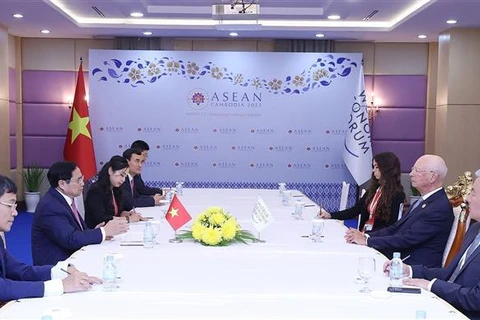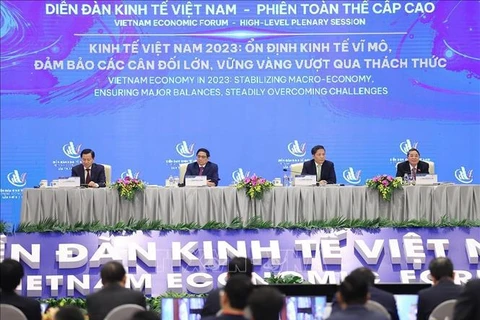Hanoi (VNA) – The Australian Government is increasing its support for partners in Southeast Asia to help their transition to net zero, and Vietnam is central to these efforts, David Gottlieb, Australian Acting Deputy Ambassador to Vietnam, told the recent fifth Vietnam Economic Forum.
“We are expanding our support for Vietnam in its energy transition and to achieve ambitious climate targets,” Gottlieb said in his speech delivered at the forum, themed “Vietnam Economy in 2023: Stabilising Macro-economy, Ensuring Major Balances, Steadily Overcoming Challenges”.
He commended Vietnam and the Government of Prime Minister Pham Minh Chinh for the ambitious commitment to transition to a net zero emission economy by 2050.
This showed the world that Vietnam is open for green business, building a stable investment environment that can help unleash billions of dollars of renewable energy and zero emissions technology investment.
According to him, both Vietnam and Australia have a high proportion of coal power in terms of electricity generation; and like Vietnam, Australia has an abundance of sunshine, wind, gas and natural attributes, making them two of the world’s most attractive markets for energy investment.
“We also both have a range of future green economy resources, including critical minerals deposits for battery technologies and renewables industries, and the potential to develop energy technology and services,” stated Gottlieb.
The Australian went on to say that in transitioning to net zero, one of the biggest challenges will be to manage stability, reliability and affordability of rapid renewable expansion.
Therefore, significant investment and suitable policies are needed to help achieve coal transition more reliably and smoothly, and avoid the risk that policies designed to protect existing industrial structures could unnecessarily delay the transition and keep high emitting installations operating longer than necessary.
He said that he is hugely optimistic about Vietnam’s future, as the world’s climate emergency is really Vietnam and Australia’s economic opportunity.
However, the potential in renewable energy can only be realized with “right policies”. Ambition is important. But careful plans, implemented with determination, are even more important, he stressed.
“Vietnam hit the ground the running at COP26 with a strong agenda of climate action, and I have confidence that it will continue how it began. The recent announcement of the Joint Energy Transition Partnership is an excellent example of this,” he said.
The deputy ambassador said that Australia is working with Vietnamese agencies to promote peer-to-peer partnership between the two countries’ energy regulators, develop key energy state-owned enterprises’ business transition strategies in line with energy transition, develop the legal framework for offshore wind industry, and facilitate the transition of the competitive electricity market.
The 5th Vietnam Economic Forum, held in Hanoi on December 17, drew the participation of more than 1,000 delegates who are leaders of central and local agencies, ministries and sectors, and representatives of international organisations, embassies and general consulates of other countries in Vietnam, as well as leaders of businesses, associations, universities and research institutes, along with domestic and international experts./.
“We are expanding our support for Vietnam in its energy transition and to achieve ambitious climate targets,” Gottlieb said in his speech delivered at the forum, themed “Vietnam Economy in 2023: Stabilising Macro-economy, Ensuring Major Balances, Steadily Overcoming Challenges”.
He commended Vietnam and the Government of Prime Minister Pham Minh Chinh for the ambitious commitment to transition to a net zero emission economy by 2050.
This showed the world that Vietnam is open for green business, building a stable investment environment that can help unleash billions of dollars of renewable energy and zero emissions technology investment.
According to him, both Vietnam and Australia have a high proportion of coal power in terms of electricity generation; and like Vietnam, Australia has an abundance of sunshine, wind, gas and natural attributes, making them two of the world’s most attractive markets for energy investment.
“We also both have a range of future green economy resources, including critical minerals deposits for battery technologies and renewables industries, and the potential to develop energy technology and services,” stated Gottlieb.
The Australian went on to say that in transitioning to net zero, one of the biggest challenges will be to manage stability, reliability and affordability of rapid renewable expansion.
Therefore, significant investment and suitable policies are needed to help achieve coal transition more reliably and smoothly, and avoid the risk that policies designed to protect existing industrial structures could unnecessarily delay the transition and keep high emitting installations operating longer than necessary.
He said that he is hugely optimistic about Vietnam’s future, as the world’s climate emergency is really Vietnam and Australia’s economic opportunity.
However, the potential in renewable energy can only be realized with “right policies”. Ambition is important. But careful plans, implemented with determination, are even more important, he stressed.
“Vietnam hit the ground the running at COP26 with a strong agenda of climate action, and I have confidence that it will continue how it began. The recent announcement of the Joint Energy Transition Partnership is an excellent example of this,” he said.
The deputy ambassador said that Australia is working with Vietnamese agencies to promote peer-to-peer partnership between the two countries’ energy regulators, develop key energy state-owned enterprises’ business transition strategies in line with energy transition, develop the legal framework for offshore wind industry, and facilitate the transition of the competitive electricity market.
The 5th Vietnam Economic Forum, held in Hanoi on December 17, drew the participation of more than 1,000 delegates who are leaders of central and local agencies, ministries and sectors, and representatives of international organisations, embassies and general consulates of other countries in Vietnam, as well as leaders of businesses, associations, universities and research institutes, along with domestic and international experts./.
VNA
























